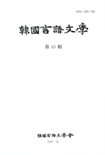- 영문명
- Poetic World of Lee Yong-ag during Liberation Period
- 발행기관
- 한국언어문학회
- 저자명
- 최명표(Choi Myoungpyo)
- 간행물 정보
- 『한국언어문학』韓國言語文學 第63輯, 327~346쪽, 전체 20쪽
- 주제분류
- 어문학 > 한국어와문학
- 파일형태
- 발행일자
- 2007.12.30

국문 초록
영문 초록
This study was aimed to examine the poetic consciousness of Lee Yong-ag who had wandered about during a period of Liberation and its causes and consequences. He participated in group literary movement while exposing his political inclination in the then liberated country, but he adhered strictly to sensibility as a poet always missing his hometown psychologically.
Space awareness shown in his poems before Liberation remained balanced between the centripetal force towards the North and the centrifugal force out of the North. However, since he chose Seoul as his actual space after liberation, his space awareness came out of balance.
In political situations during the Liberation period, Seoul was like ‘an intersection’ and the North was ‘a back street’. In addition, ‘the intersection’ was the scene of realism-oriented poems noisy with voices of various groups, while ‘the back street’ was a hiding place of modernism-oriented poems filled with the monologues of poetic egos. As a person with dual thought, he preferred being in the back street alone while standing in the square of ‘the intersection’ where many people gathered.
Lee Yong-ag revealed a psychological state of his confusion in his own works published during a period of Liberation. The reason for his conflicts, more or less voluntarily chosen, might be due to his unfaithful performance of his duties as a member and his damage to his characteristic as a lyric poet. Therefore, the prose poem that he chose contributed only to the exposure of his wandering in turbulent political situations, but he could not help being collapsed in aesthetic aspects ensuring his poetic accomplishments.
Lee Yong-ag"s quest for ‘the ocean’ that has not clarified his true objectives entered upon a wandering phase after Liberation. As a result, his armament through poetry became an empty shout and he nullified his actions during a period of Liberation at a stroke by leaving for the North during the Korean War.
Space awareness shown in his poems before Liberation remained balanced between the centripetal force towards the North and the centrifugal force out of the North. However, since he chose Seoul as his actual space after liberation, his space awareness came out of balance.
In political situations during the Liberation period, Seoul was like ‘an intersection’ and the North was ‘a back street’. In addition, ‘the intersection’ was the scene of realism-oriented poems noisy with voices of various groups, while ‘the back street’ was a hiding place of modernism-oriented poems filled with the monologues of poetic egos. As a person with dual thought, he preferred being in the back street alone while standing in the square of ‘the intersection’ where many people gathered.
Lee Yong-ag revealed a psychological state of his confusion in his own works published during a period of Liberation. The reason for his conflicts, more or less voluntarily chosen, might be due to his unfaithful performance of his duties as a member and his damage to his characteristic as a lyric poet. Therefore, the prose poem that he chose contributed only to the exposure of his wandering in turbulent political situations, but he could not help being collapsed in aesthetic aspects ensuring his poetic accomplishments.
Lee Yong-ag"s quest for ‘the ocean’ that has not clarified his true objectives entered upon a wandering phase after Liberation. As a result, his armament through poetry became an empty shout and he nullified his actions during a period of Liberation at a stroke by leaving for the North during the Korean War.
목차
1. 서론
2. 이중적 사유와 고뇌의 표정
3. 결론
〈참고문헌〉
[Abstract]
2. 이중적 사유와 고뇌의 표정
3. 결론
〈참고문헌〉
[Abstract]
해당간행물 수록 논문
참고문헌
최근 이용한 논문
교보eBook 첫 방문을 환영 합니다!

신규가입 혜택 지급이 완료 되었습니다.
바로 사용 가능한 교보e캐시 1,000원 (유효기간 7일)
지금 바로 교보eBook의 다양한 콘텐츠를 이용해 보세요!


